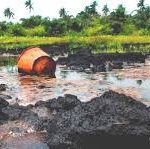More than a week after the first oil spill along the Ogboinbiri/Tebidaba pipeline at Ogboinbiri since OANDO’s acquisition, an Indigenous oil company, community residents, and environmental activists are calling for immediate action as the spill spreads across the rainforest and swamps, contaminating fish ponds, rivulets, and arable farmlands along its path.
This seems like a normal pathway into the Ogboinbiri rainforest. But it is the pipeline right of way leading to the point of a recent oil spill still spreading across the forest due to a lack of effective containment measures in place.
As part of Oil Mining Lease Sixty-three (OML 63), the Community plays host to the Ogboinbiri Gas Plant and Flow Station established in 1989 and operated by the Nigerian Agip Oil Company till a recent takeover of its oil onshore field by an Indigenous oil company, OANDO.
Like most oil-producing communities, Ogboinbiri has experienced several oil spill incidents over the years, some of which were officially declared as equipment failures.
However, the community is unhappy with the way oil spill-impacted sites are often left uncleaned but rather allegedly setting such sites ablaze; referring to a 2021 incident.
Ekeinka Genesis is a fish farmer, whose fishing routes and ponds have become casualties to the unfortunate oil spill which has continued to spread in the environment with negative impacts in the swamp and arable farmlands along its part.
Confirmed documents of a Joint Investigation visit by relevant key players, including the National Oil Spill Detection and Response Agency and the Bayelsa State Ministry of Environment, reveal equipment failure as the cause of the oil spill but delayed environmental action means the spill will continue to spread way beyond the scope already captured in the report.
While a case is made for the immediate clean-up of the environment, the community also seeks better relations with the company; especially in the company’s response to emergencies such as oil spills.
Figures from the Global Energy Monitor show that the Ogboinbiri oil field produces over 5.6 million cubic meters of crude oil per year.














